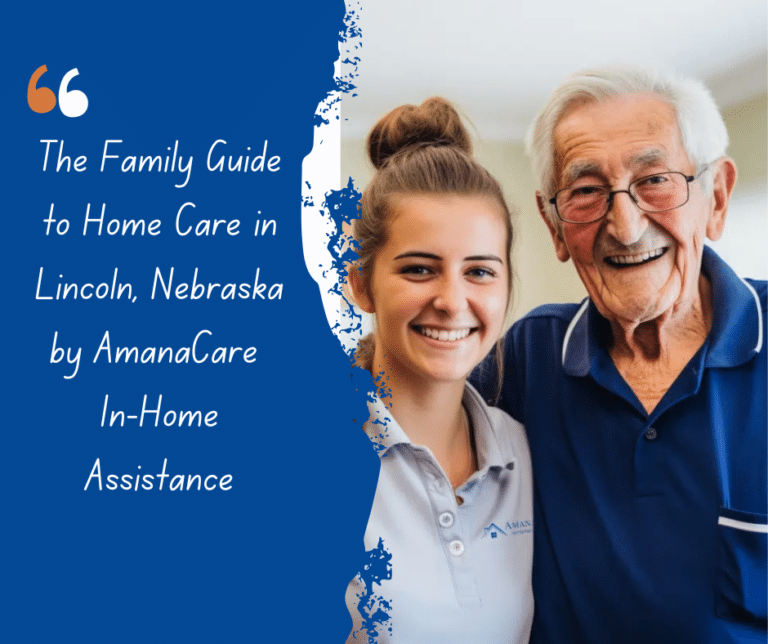Have Questions About Home Care? Talk to Us.
Introduction to Home Care in Lincoln, Nebraska
Home care services in Lincoln offer vital support for seniors, helping them stay in their own homes while getting the care they need. These services include personal assistance, skilled nursing, and therapy, all designed to improve the quality of life for seniors.
Home care is essential for families looking for professional and compassionate support for their elderly loved ones.
Comprehensive Home Care Services
Home care in Lincoln includes a range of services to meet different needs:
AmanaCare Provides Personal Care Assistance: This service includes help with daily activities such as bathing, dressing, grooming, and meal preparation. Caregivers ensure that seniors maintain their personal hygiene and nutrition, which are crucial for their overall health and well-being. Assistance with these daily tasks not only supports physical health but also helps maintain a sense of dignity and independence for seniors.
AmanaCare Provides Specialized Home Care: This includes tailored care plans for seniors with specific conditions like dementia, Alzheimer’s, Parkinson’s disease, and other chronic illnesses. Specialized care also means supportive assistance with hospice care, which focuses on providing comfort and support to those with serious or terminal illnesses. This type of care involves managing symptoms, providing emotional and psychological support, and ensuring that seniors live with dignity and comfort.
Skilled Nursing Services: (AmanaCare does not provide skilled nursing but we can refer you to a reputable agency!) These services are provided by licensed nurses who can offer medical care such as medication management, wound care, injections, and monitoring of vital signs. Also called “home health care”, Skilled nursing is essential for seniors recovering from surgery, managing chronic diseases, or requiring specialized medical attention. This type of care ensures that seniors receive the medical support they need at home, reducing the need for frequent hospital visits.
Therapy Services: (AmanaCare does not provide therapy but we can refer you to a reputable agency!) Therapy services include physical, occupational, and speech therapy, which help seniors regain or maintain their physical abilities and improve their daily functioning. Physical therapy can aid in recovery from injuries or surgeries, occupational therapy helps seniors adapt to physical limitations, and speech therapy addresses communication and swallowing difficulties. These therapies are tailored to individual needs and are vital for enhancing mobility, independence, and quality of life.
"Caring for someone else is the highest expression of love."
- Unknown
Innovative Home Care Solutions
Soon you will see that home care in Lincoln includes new solutions to improve care quality:
Telehealth: Virtual consultations allow seniors to get medical advice from home, reducing hospital visits. Through video calls, seniors can consult with doctors, receive follow-ups, and manage chronic conditions without leaving their homes. This technology is particularly beneficial for those with mobility issues or those living in remote areas.
Remote Monitoring: Technology enables continuous monitoring of vital signs and health conditions, ensuring timely interventions. Devices such as wearable health monitors can track heart rate, blood pressure, glucose levels, and other vital signs. This data can be shared with healthcare providers in real-time, allowing for immediate action if any anomalies are detected.
Adaptive Technology: Devices like medication dispensers, fall detectors, and communication aids enhance safety and independence for seniors. Medication dispensers ensure that seniors take their medications on time, while fall detectors alert caregivers immediately in case of a fall. Communication aids help seniors stay connected with their caregivers and family members, reducing feelings of isolation and enhancing their quality of life.
Telemedicine is a more beneficial technology that can make it easier for people to get preventive treatment and help their long-term health. It is particularly true for those who face financial or regional causes to receiving quality treatment. Telehealth has the potential to make health care more effective, organised, and available.
https://www.ncbi.nlm.nih.gov/pmc/articles/PMC8590973/

How to Choose the Right Home Care Provider
"You are braver than you believe, stronger than you seem, and smarter than you think."
A.A. Milne
When choosing a home care provider in Lincoln, consider these factors:
Credentials and Certifications: Ensure the provider is licensed and accredited by relevant health authorities. Check for certifications from reputable organizations such as the Joint Commission or the Accreditation Commission for Health Care (ACHC). These certifications indicate that the provider meets high standards of care and compliance.
Staff Training and Qualifications: Verify that caregivers and nurses have the necessary training and experience. Look for providers who invest in ongoing education and training for their staff to stay updated with the latest caregiving techniques and medical advancements.
Customization of Care Plans: Choose a provider that offers personalized care plans tailored to the individual health requirements and preferences of the senior. Personalized care plans ensure that the specific needs of the senior are met, whether they require specialized medical care, personal assistance, or therapy services.
Client Testimonials and Reviews: Look for positive feedback from current and past clients. Reading reviews and testimonials can provide insights into the provider’s quality of care, reliability, and client satisfaction.
Emergency and After-Hours Support: Confirm that the provider offers round-the-clock support for emergencies and urgent care needs. It’s important to know that help is available at any time, especially during unexpected situations or medical emergencies.
Financial Considerations for Home Care

Understanding the financial aspects of home care is crucial:
Costs and Payment Options: Home care costs can vary based on the level of care required. Discuss hourly rates, package deals, and what services are included. Some providers may offer bundled services at a discounted rate, which can be more cost-effective.
Insurance Coverage: Many home care services are covered by Medicaid, long-term care insurance, and veterans’ benefits.
Medicare/Medicaid: Check eligibility for home care coverage under Medicare and Medicaid. Medicare may cover short-term skilled nursing care, while Medicaid can assist with long-term personal care services. It’s important to understand the specific conditions and requirements for coverage under these programs.
Financial Assistance Programs: Local and national programs may provide financial aid for home care services. These can include grants, subsidies, and charitable organizations that help cover the costs of home care for those in need.
"The best way to find yourself is to lose yourself in the service of others."
Mahatma Gandhi
How to Start Home Care Services
Starting home care services involves these steps:
Initial Consultation and Assessment: Meet with a care coordinator to discuss needs and conduct a thorough assessment of the senior’s health and living situation. This initial assessment helps to identify the specific needs and preferences of the senior.
Creating and Customizing a Care Plan: Develop a personalized care plan that addresses specific health requirements and preferences. The care plan should outline the types of services needed, the schedule of care, and any special instructions for caregivers.
Monitoring and Adjusting Care: Regularly review and adjust the care plan to ensure it continues to meet the evolving needs of the senior. Continuous monitoring helps to address any changes in the senior’s health condition and to make necessary adjustments to the care plan.
"Strength does not come from winning. Your struggles develop your strengths. When you go through hardships and decide not to surrender, that is strength."
Arnold Schwarzenegger
Community Resources and Support for Seniors
Lincoln offers many resources to support seniors and their families:
Senior Centers and Support Groups: Provide social interaction, educational programs, and emotional support. Senior centers often offer activities such as exercise classes, art workshops, and social events that help seniors stay active and engaged.
Community Health Resources: Offer medical services, wellness programs, and preventive care. These resources include community clinics, health fairs, and vaccination programs that ensure seniors receive comprehensive healthcare.
Volunteer and Social Programs: Engage seniors in community activities, fostering a sense of belonging and purpose. Volunteer programs can include opportunities for seniors to contribute their skills and knowledge, while social programs help reduce feelings of isolation and loneliness.
"Kindness is the oil that takes the friction out of life."
Author Unknown
Frequently Asked Questions
What types of training do caregivers typically receive?
Caregivers undergo training in areas like personal care, emergency response, medication management, and specialized care for conditions such as dementia or Alzheimer’s. Training ensures that caregivers are equipped to handle various caregiving scenarios and provide high-quality care.
How can I modify my home to be safer for an elderly family member?
Home modifications can include installing grab bars, ramps, stairlifts, improved lighting, and non-slip flooring to enhance safety and accessibility. These modifications help prevent falls and ensure that seniors can move around their homes safely.
What mental health resources are available for seniors?
Seniors can access counseling, support groups, and mental health programs through community centers, healthcare providers, and online platforms. Mental health resources help address issues such as depression, anxiety, and loneliness, promoting overall well-being.
Why is proper nutrition important for seniors, and what dietary considerations should be made?
Proper nutrition helps prevent chronic diseases, maintain energy levels, and support overall health. Seniors should focus on balanced diets rich in vitamins, minerals, and fiber. It’s also important to consider any dietary restrictions or special needs, such as low-sodium or diabetic diets.
What legal documents are essential for elderly care planning?
Important legal documents include power of attorney, living wills, healthcare directives, and estate planning documents to ensure wishes are respected and care is coordinated. These documents help outline the senior’s preferences for medical treatment and financial management, and appoint trusted individuals to make decisions on their behalf if they become unable to do so.
How can we prepare seniors for emergencies or natural disasters?
Create an emergency plan that includes a list of contacts, medication supplies, a go-bag with essentials, and a clear evacuation route tailored to the senior’s mobility and health needs. Ensuring that seniors have a support network and access to emergency services is crucial for their safety during unexpected events.
What are the benefits of using technology in elderly care?
Technology can enhance care through telehealth consultations, remote monitoring, medication reminders, and social engagement tools, improving safety, health management, and connection with loved ones. These technological advancements help seniors maintain their independence and receive timely medical interventions when needed.






